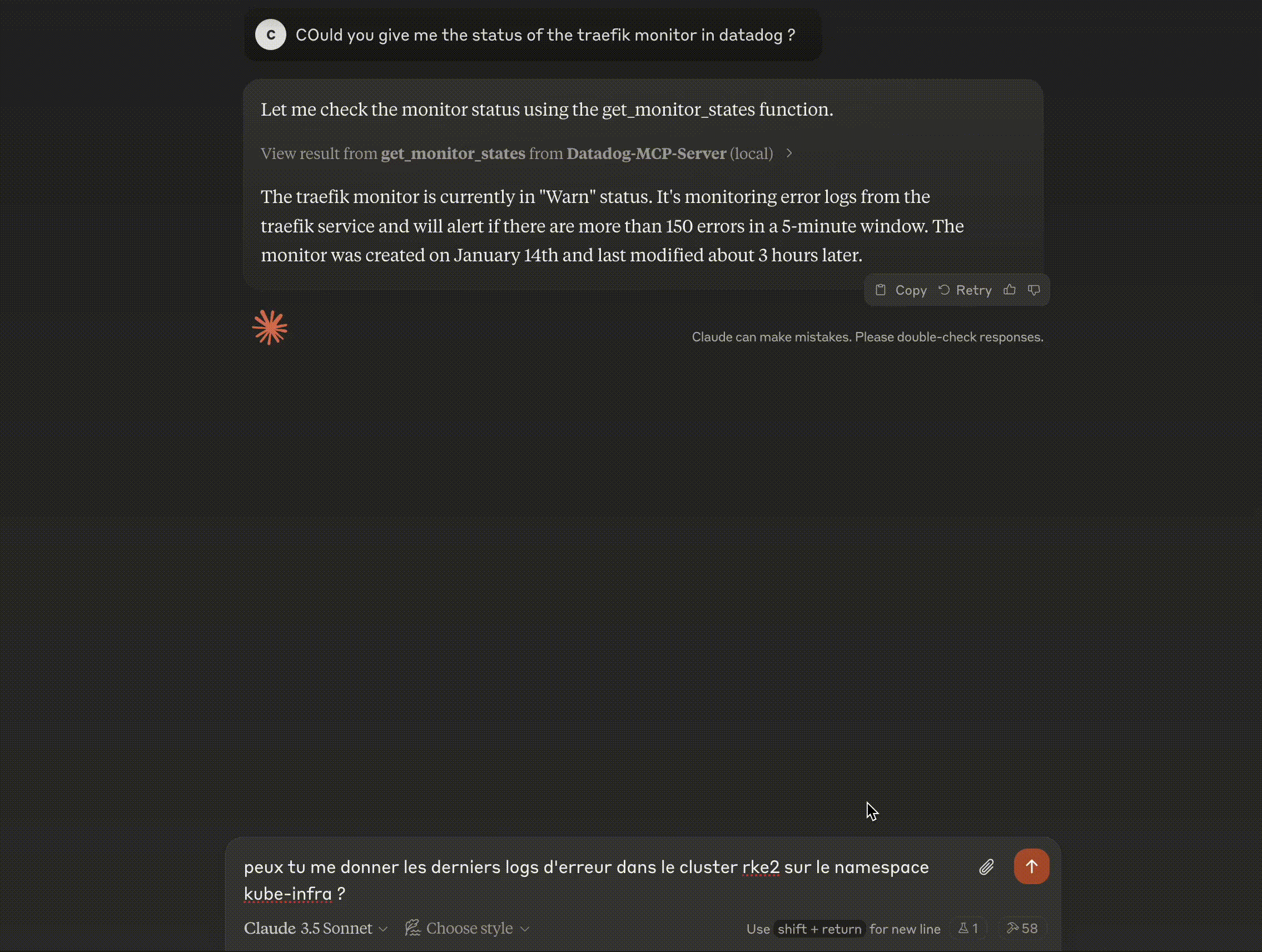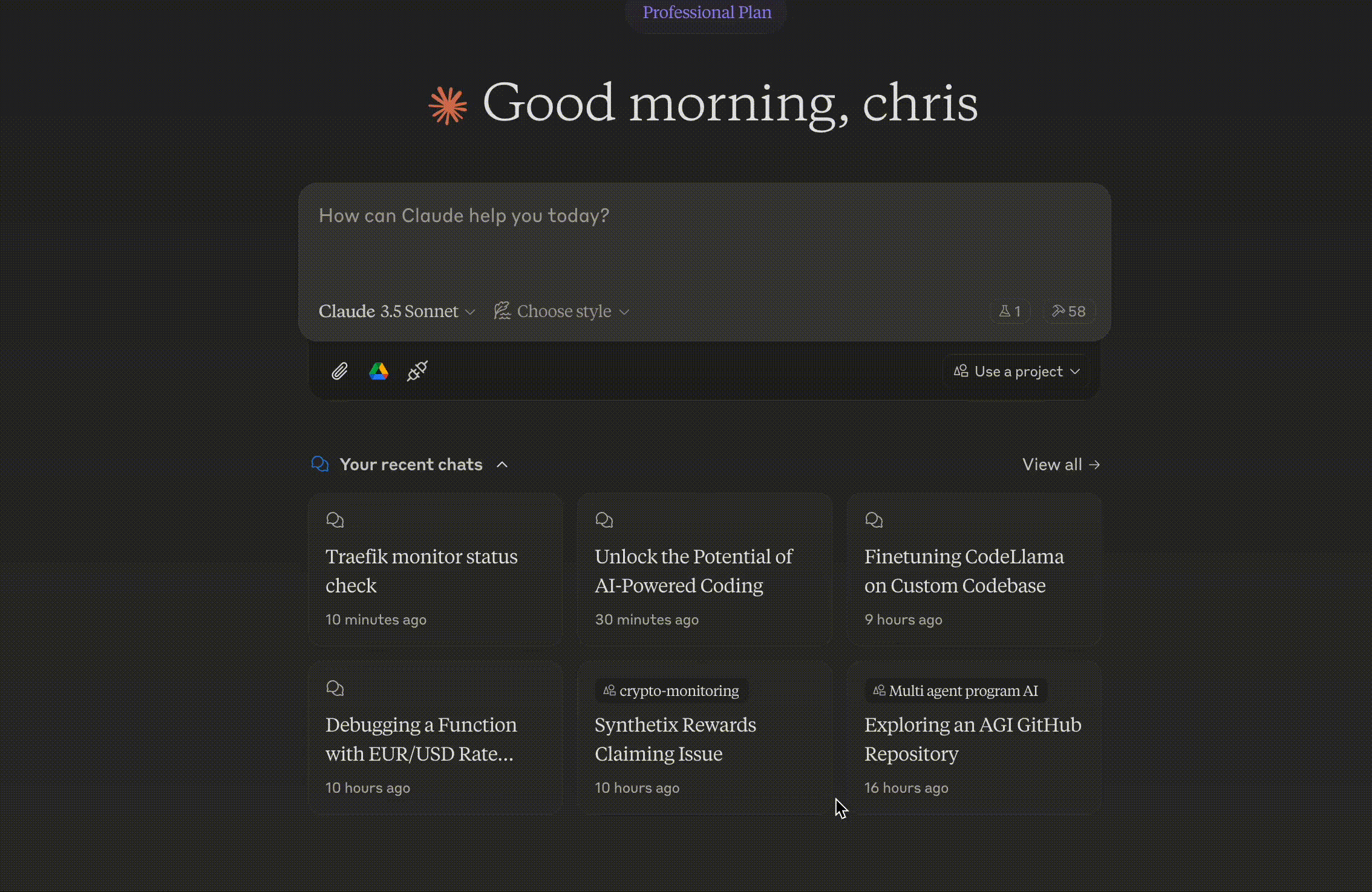A Python-based tool to interact with Datadog API and fetch monitoring data from your infrastructure. This MCP provides easy access to monitor states and Kubernetes logs through a simple interface.
- Monitor State Tracking: Fetch and analyze specific monitor states
- Kubernetes Log Analysis: Extract and format error logs from Kubernetes clusters
- Python 3.11+
- Datadog API and Application keys (with correct permissions)
- Access to Datadog site
To install Datadog for Claude Desktop automatically via
npx -y @smithery/cli install @didlawowo/mcp-collection --client claudeRequired packages:
datadog-api-client
fastmcp
loguru
icecream
python-dotenv
uv
Create a .env file with your Datadog credentials:
DD_API_KEY=your_api_key
DD_APP_KEY=your_app_key- Install Claude Desktop
# Assuming you're on macOS
brew install claude-desktop
# Or download from official website
https://claude.ai/desktop- Set up Datadog MCP config:
# on mac is
~/Library/Application\ Support/Claude/claude_desktop_config.json
# Add this to your claude config json
```json
"Datadog-MCP-Server": {
"command": "uv",
"args": [
"run",
"--with",
"datadog-api-client",
"--with",
"fastmcp",
"--with",
"icecream",
"--with",
"loguru",
"--with",
"python-dotenv",
"fastmcp",
"run",
"/your-path/mcp-collection/datadog/main.py"
],
"env": {
"DD_API_KEY": "xxxx",
"DD_APP_KEY": "xxx"
}
},- FastMCP Base: Utilizes FastMCP framework for tool management
- Modular Design: Separate functions for monitors and logs
- Type Safety: Full typing support with Python type hints
- API Abstraction: Wrapped Datadog API calls with error handling
I'll add a section about MCP and Claude Desktop setup:
Model Context Protocol (MCP) is a framework allowing AI models to interact with external tools and APIs in a standardized way. It enables models like Claude to:
- Access external data
- Execute commands
- Interact with APIs
- Maintain context across conversations
https://github.com/punkpeye/awesome-mcp-servers?tab=readme-ov-file
the LLM use provided function to get the data and use it
get_monitor_states(
name: str, # Monitor name to search
timeframe: int = 1 # Hours to look back
)Example:
response = get_monitor_states(name="traefik")
# Sample Output
{
"id": "12345678",
"name": "traefik",
"status": "OK",
"query": "avg(last_5m):avg:traefik.response_time{*} > 1000",
"message": "Response time is too high",
"type": "metric alert",
"created": "2024-01-14T10:00:00Z",
"modified": "2024-01-14T15:30:00Z"
}get_k8s_logs(
cluster: str, # Kubernetes cluster name
timeframe: int = 5, # Hours to look back
namespace: str = None # Optional namespace filter
)Example:
logs = get_k8s_logs(
cluster="prod-cluster",
timeframe=3,
namespace="default"
)
# Sample Output
{
"timestamp": "2024-01-14T22:00:00Z",
"host": "worker-1",
"service": "nginx-ingress",
"pod_name": "nginx-ingress-controller-abc123",
"namespace": "default",
"container_name": "controller",
"message": "Connection refused",
"status": "error"
}# Install as MCP extension
cd datadog
task install-mcpcheck datadog connection in claude
- Store API keys in
.env - MCP runs in isolated environment
- Each tool has defined permissions
- Rate limiting is implemented
# Launch MCP Inspector for debugging
task run-mcp-inspectorThe MCP Inspector provides:
- Real-time view of MCP server status
- Function call logs
- Error tracing
- API response monitoring
-
API Authentication Errors
Error: (403) Forbidden
➡️ Check your DD_API_KEY and DD_APP_KEY in .env
-
MCP Connection Issues
Error: Failed to connect to MCP server
➡️ Verify your claude_desktop_config.json path and content
-
Monitor Not Found
Error: No monitor found with name 'xxx'➡️ Check monitor name spelling and case sensitivity
-
logs can be found here
Feel free to:
- Open issues for bugs
- Submit PRs for improvements
- Add new features
- API calls are made to Datadog EU site
- Default timeframe is 1 hour for monitor states
- Page size limits are set to handle most use cases



